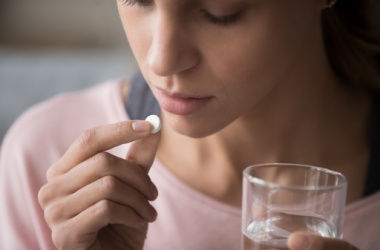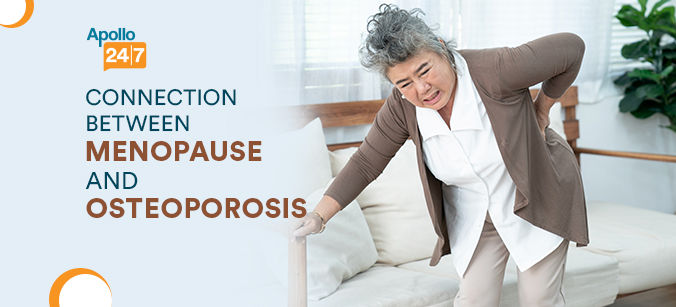Women's Wellness
Menopause: The Different Stages
5 min read
By Apollo 24/7, Published on - 15 February 2021, Updated on - 22 May 2024
Share this article
0
0 like

Menopause is not a single event but a transition that takes place over months and years. It is a natural stage that occurs in every woman’s life as they age, where their ovaries stop producing eggs and estrogen (female sex hormone). After menopause, a woman does not get periods and cannot get pregnant naturally.
The entire process of menopause is divided into three transitional stages - perimenopause (before menopause), menopause and post-menopause (after attaining menopause). The symptoms and duration of each transition can be different for each woman.
Perimenopause: The beginning of the transition
Perimenopause is the initial stage of menopause where women experience an array of symptoms due to the sudden shift in hormone levels. Perimenopause begins with irregular period cycles, which is followed by the gradually decreasing functioning of the ovaries. It is common to experience irregular periods during perimenopause, however, there are various other reasons that may result in abnormalities in menstrual bleeding. If a woman experiences any of these signs, they must consult a doctor:
- Heavy periods accompanied by blood clots
- Spotting or bleeding after periods
- Spotting after a sexual intercourse
- Little or no gap between two-period cycles
Perimenopause can begin several years before actual menopause (usually experienced in the late 40s) and usually lasts for three to four years. In some cases, perimenopause is experienced for just a few months, while in others it can extend to years. Perimenopause ends when the ovaries stop producing eggs completely.
During perimenopause, the ovaries start reducing the production of estrogen and progesterone in the body, which results in a number of symptoms. Some of these symptoms involve:
- Abruptly ended periods or increased frequency of periods
- Hot flashes/ flushes (sudden feeling of warmth felt on the face and neck)
- Insomnia (inability to sleep)
- Night sweats (warmth at night)
- Inability to sleep at night (insomnia)
- Increased heart rate (palpitations)
- Vaginal dryness
- Pain while having sexual intercourse
- Low libido (sex drive)
- Inability to hold urine (urinary incontinence)
- Recurrent urinary tract infections
- Irritability, mood swings and inability to concentrate.
A woman may get pregnant during perimenopause, thus birth control measures such as protective barriers (condoms), pills, intrauterine devices can continue to be used.
Menopause: End of reproductive age
Women are considered to have reached menopause when they do not get periods for 12 consecutive months without undergoing other condition such as an illness, medication, pregnancy or breastfeeding. At this stage, a woman is no longer at risk of getting pregnant.
Most women enter menopause at the age of 50 to 52 years, however, this age can vary for every woman. It has been noticed that women reach menopause around the same age as their mothers. Studies have shown that women who smoke are more likely to reach menopause ahead of the rest. While for most women this marks the end of the perimenopausal symptoms, some women may still experience them for a little longer.
Post-menopause: Life after menopause
Post-menopause is the time period following menopause. In this phase, the woman may no longer have anxiety and mood swings. However, there is an increased risk of osteoporosis, heart diseases, urinary issues and vaginal problems due to the reduced levels of estrogen and progesterone in the body.
.jpg)
What can be done to manage the symptoms of menopause?
A woman may experience the symptoms of menopause due to the lack of estrogen and progesterone in the body. Hormone replacement therapy is a treatment in which the woman is provided with sex hormones that are not produced by the ovaries after menopause. However, due to the various side effects associated with this therapy, people prefer adopting other effective measures, which may help reduce the menopausal symptoms:
- Consume a diet filled with whole grains, fruits, green vegetables, soybeans, chickpeas, lentils and healthy seeds (flaxseeds) to reduce the frequency of hot flashes.
- Add calcium-rich foods such as low-fat milk, cheese and yoghurt in your diet to maintain bone health.
- Reduce or avoid the consumption of hot beverages, caffeine, spicy food, alcohol and certain medications as they can trigger hot flashes.
- Reduce the consumption of salt, to control blood pressure and to avoid bloating.
- Cut down the consumption of caffeine and alcohol as they retain water in the body and increase the frequency of urination.
- Quit smoking, for women who smoke
- Get adequate calcium and vitamin D in food or supplements
- Practice yoga, meditation and Tai chi (a martial art form) to decrease anxiety and improve mental wellness.
- Use estrogen-based vaginal lubricants to reduce vaginal dryness.
- Use water-based lubricants during sexual intercourse to reduce pain.
- Practice kegel exercises to strengthen the muscles of the pelvic floor, thus improving the ability to hold urine.
What is early menopause?
A woman may experience early menopause in some conditions, which include:
- Surgical removal of uterus (hysterectomy) or ovaries (oophorectomy)
- Premature Ovarian Failure due to genetics, surgery, or cancer treatments
- Ovarian dysfunction
- Insufficient follicles (thus fewer eggs in the ovary)
Takeaway
Menopause is a natural phenomenon that is experienced by women at the age of 45 to 55 years. Women may experience a variety of symptoms during the early stages of menopause, which may gradually reduce with time. After menopause is achieved, the woman may experience loss of muscle mass and bone density, making them prone to fractures and other bone-related issues. Therefore, they must consult a doctor if they show early signs of bone loss (pain and swelling in joints) or have a family history of osteoporosis.
For any queries related to women's health, speak to a gynaecologist.
Women can get a comprehensive test done from Apollo 24/7 to ensure overall health.
Leave Comment
Recommended for you

Women's Wellness
Multivitamins For Working Women: Why Are These A Necessity?
Working women require energy and good health to maintain their hectic lifestyles. Multivitamins are a great way to prevent nutrient deficiencies, help them stay fit, and sustain their busy schedules.

Women's Wellness
Can a Diet Rich in Omega-3 Fatty Acids Prevent PCOS?
A recent study found that consuming a diet rich in omega-3 polyunsaturated fatty acids (PUFAs) may reduce the risk of developing PCOS.

Women's Wellness
Menopause and Osteoporosis: When to Start Worrying About Your Bones?
Oestrogen, an important hormone that strengthens the bone mass, drops substantially around menopause. Thereby, dropping an average woman's bone mass by up to 10% in the first five years after menopause. Read more to know how you can prevent weak and brittle bones as you reach your 50's.
Subscribe
Sign up for our free Health Library Daily Newsletter
Get doctor-approved health tips, news, and more.
Recommended for you

Women's Wellness
Multivitamins For Working Women: Why Are These A Necessity?
Working women require energy and good health to maintain their hectic lifestyles. Multivitamins are a great way to prevent nutrient deficiencies, help them stay fit, and sustain their busy schedules.

Women's Wellness
Can a Diet Rich in Omega-3 Fatty Acids Prevent PCOS?
A recent study found that consuming a diet rich in omega-3 polyunsaturated fatty acids (PUFAs) may reduce the risk of developing PCOS.

Women's Wellness
Menopause and Osteoporosis: When to Start Worrying About Your Bones?
Oestrogen, an important hormone that strengthens the bone mass, drops substantially around menopause. Thereby, dropping an average woman's bone mass by up to 10% in the first five years after menopause. Read more to know how you can prevent weak and brittle bones as you reach your 50's.